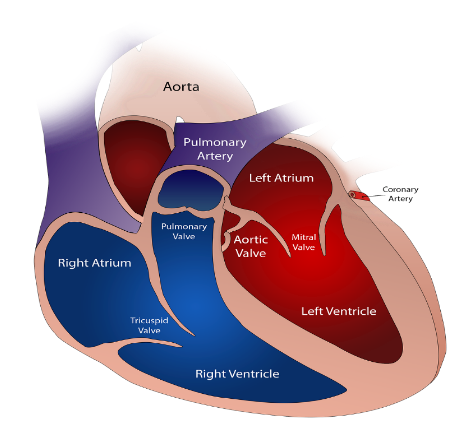
Arteries carry oxygenated blood except
(A) Pulmonary
(B) Cardiac
(C) Hepatic
(D) Systematic
Answer
573.9k+ views
Hint: The heart is the main circulatory organ that helps in the pumping of the blood to the different parts of the body. In humans and animals, it is four chambered. It consists of arteries and the veins. The auricles always carry the oxygenated blood and the veins are there to carry the deoxygenated blood.
Complete answer:
Arteries are the blood tubes that carry the oxygenated blood from the heart and transport it to all parts of the body. Arteries start with the aorta from the heart and this is the biggest blood capillaries in the body. The aorta originates from the head of the left ventricle. Arteries transmits the blood rich in oxygen from the heart to the entirety of the body's tissues.

They branch into many small blood capillaries when they move away from the heart. The pulse in the arteries is always higher than other different parts of the circulatory framework. All the arteries carry the oxygenated blood. But the pulmonary artery carries the deoxygenated blood from the heart and delivers it to the lungs for the purpose of oxygenation of the blood. And after adding oxygen to the blood, it was carried by the pulmonary veins to the heart. Hence except pulmonary artery, other arteries carry the oxygenated blood.
Hence the correct answer is OPTION(A)
Note: The pressure in arteries changes during the cardiovascular cycle. It is most elevated when the heart contracts and least when the heart unwinds. The variation in pressure delivers a pulse, which can be felt in different regions of the body. Consequently, the blood from the heart is moved to all pieces of the body by the "arteries".
Complete answer:
Arteries are the blood tubes that carry the oxygenated blood from the heart and transport it to all parts of the body. Arteries start with the aorta from the heart and this is the biggest blood capillaries in the body. The aorta originates from the head of the left ventricle. Arteries transmits the blood rich in oxygen from the heart to the entirety of the body's tissues.

They branch into many small blood capillaries when they move away from the heart. The pulse in the arteries is always higher than other different parts of the circulatory framework. All the arteries carry the oxygenated blood. But the pulmonary artery carries the deoxygenated blood from the heart and delivers it to the lungs for the purpose of oxygenation of the blood. And after adding oxygen to the blood, it was carried by the pulmonary veins to the heart. Hence except pulmonary artery, other arteries carry the oxygenated blood.
Hence the correct answer is OPTION(A)
Note: The pressure in arteries changes during the cardiovascular cycle. It is most elevated when the heart contracts and least when the heart unwinds. The variation in pressure delivers a pulse, which can be felt in different regions of the body. Consequently, the blood from the heart is moved to all pieces of the body by the "arteries".
Recently Updated Pages
Master Class 11 Computer Science: Engaging Questions & Answers for Success

Master Class 11 Business Studies: Engaging Questions & Answers for Success

Master Class 11 Economics: Engaging Questions & Answers for Success

Master Class 11 English: Engaging Questions & Answers for Success

Master Class 11 Maths: Engaging Questions & Answers for Success

Master Class 11 Biology: Engaging Questions & Answers for Success

Trending doubts
One Metric ton is equal to kg A 10000 B 1000 C 100 class 11 physics CBSE

There are 720 permutations of the digits 1 2 3 4 5 class 11 maths CBSE

Discuss the various forms of bacteria class 11 biology CBSE

Draw a diagram of a plant cell and label at least eight class 11 biology CBSE

State the laws of reflection of light

Explain zero factorial class 11 maths CBSE




